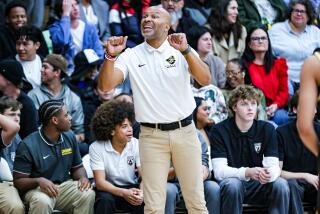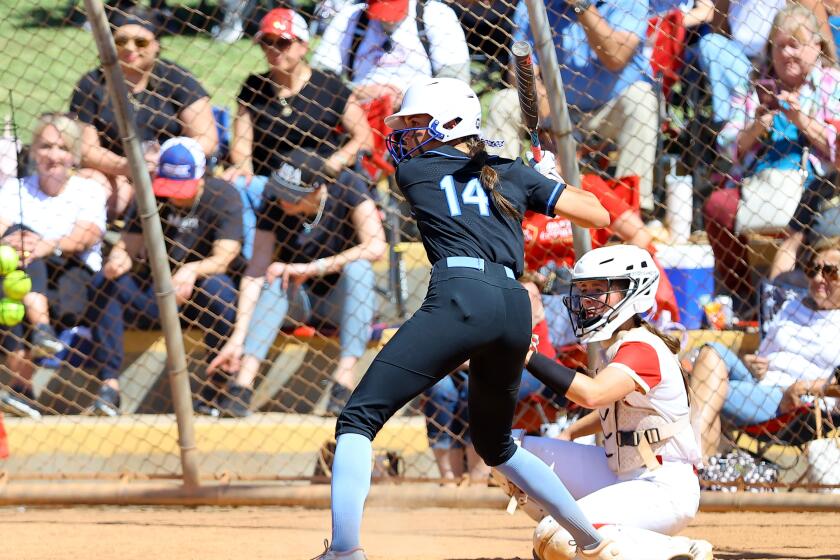To Play or Not, That’s the Issue
- Share via
Staci Venski and Aaron Peirsol are world-class athletes who have identical reasons for making distinctly different decisions about high school sports.
Venski, a member of the United States junior national volleyball team, fears burnout and, therefore, has chosen not to play for Calabasas High.
Conversely, Peirsol, a silver medalist in swimming at the 2000 Olympics, combats burnout by adding Newport Harbor High swim competitions to his already busy schedule.
The contradictory approaches stem from a dilemma facing many elite teenage athletes: Play for the high school team for fun, or skip the varsity to focus on higher-level training.
As Venski and Peirsol demonstrate, there are two schools of thought when it comes to representing your school.
Some elite athletes view high school sports as a lower level of competition that offers little benefit to their career development. They forego their high school teams, some attending sports academies or hiring a tutor and home schooling.
Others see high school sports as an escape from the pressures of competing at a high level and they enjoy the less-intense atmosphere. Of course, a good old-fashioned sense of obligation to the school doesn’t hurt either.
The sports most affected by the migration of athletes are tennis and soccer, but a handful of athletes from other sports have shied away in recent years.
Venski is among them. With the junior national team active all summer and her club team operating from November through April, she decided enough is enough.
“It just gets to be too much after a while,” Venski said. “It’s a really tough decision not to play, but if I played, then I would be playing volleyball for two years straight. I need a break and, unfortunately, that means not playing high school.”
Peirsol, who trains year-round to maintain world-class swimming shape, enjoys the relaxed atmosphere found in high school swimming and the reprieve from daily cutthroat competition.
“I do it for my mental well-being,” Peirsol said. “It’s healthy for the mind to get away from the rigorous repetitiveness of training. For me, high school swimming is essential to maintaining my love for the sport. It reminds me of why I started swimming: Because it’s fun.”
Tennis academies, such as the Weil Academy in Ojai and the IMG Academies in Florida, have grown in popularity the last 10 years and many top players flee high schools to improve their skills at such specialized institutions.
Proponents of this practice say elite players need to face top competition on a daily basis to improve. They reason that a top player seldom benefits from sleepwalking through a 6-0, 6-0, 6-0 thrashing of a lesser-skilled player.
In other individual sports, such as track and field, cross-country and swimming, an elite competitor may win with similar ease, but the true measuring sticks are the clocks. If you run a four-minute mile, it’s a four-minute mile, no matter the opponent or margin of victory.
An elite high school golfer may shoot 68 and win by 20 shots, but that doesn’t make shooting 68 any easier.
“Let’s face it, it’s pretty competitive out there,” said USC women’s tennis Coach Richard Gallien. “If you’re out there playing against someone and beating them, 6-0, 6-0, you’re going to be a step behind someone who is practicing for 15-20 hours a week.”
Still, many players do what they can to avoid abandoning their high school teams. Riza Zalameda, a Beverly Hills sophomore who is ranked No. 13 in the Southern California 18s, considered pulling out of school to be schooled at home, but changed her mind at the last minute.
Like many elite players, she has found a way to contribute to the team by making a deal with the high school coach to play a limited schedule. She plays in the important matches and can skip the matches against weaker teams. Practice is optional.
“I’m glad I did that,” Zalameda said. “I really would have missed it. Playing on a team, it’s different than any other tennis. You have teammates cheering for you, everyone in school knows you play tennis and everyone appreciates you being out there.”
Keith Sarkisian, tennis coach at Brentwood, advocates rules that prohibit part-time players. Freshman Megan Doheny approached Sarkisian at the beginning of this season with a plan to play twice a week. Sarkisian said thanks, but no thanks.
“I don’t believe in hired guns,” Sarkisian said. “There are so many teams out there that have players showing up just for the big matches, and I think that’s so unfair to the rest of the people on the team. This is a chance for individuals to experience a team sport. If you have one of these hired guns, you lose the team atmosphere.”
Dick Leach, the men’s tennis coach at USC, acknowledged that skipping the high school experience is not likely to affect recruiting, but stressed the importance of playing on a team before arriving at college.
“If you pass up the chance to be a part of a team, I think that’s a shame,” Leach said. “This sport breeds prima donnas, but if you put them on a team, it teaches them about unity and that goes a long way in life, not just in sports. I laugh at the kids who pass up high school tennis. I think they are getting bad advice.”
Most of the time, that advice comes from private instructors or club coaches. In soccer, for example, many club coaches try to dissuade players from joining the high school team. The reasoning is that the high school game is sloppy and players may pick up bad habits.
“It’s an elitist attitude,” said Don Ebert, coach of the Irvine Strikers club team. “I don’t get it sometimes.”
Ebert, who advocates playing high school sports, said players gain social responsibility, a sense of camaraderie and a sense of community when they play for their school teams.
“Where’s the harm in that?” Ebert said. “The benefits of playing high school soccer far outweigh the negatives.”
Still, there are dissenters. Larry Draluck, coach of the Southern California Blues club team, encourages each athlete to examine his goals before making the decision. He said players develop at a much higher level if they focus on playing for a club team.
“If your goal is to play for a Division I college, you won’t be prepared by a high school team,” Draluck said. “I tell kids that if that is their goal, then there are avenues better conducive to reaching that goal other than high school soccer.”
More to Read
Get our high school sports newsletter
Prep Rally is devoted to the SoCal high school sports experience, bringing you scores, stories and a behind-the-scenes look at what makes prep sports so popular.
You may occasionally receive promotional content from the Los Angeles Times.






